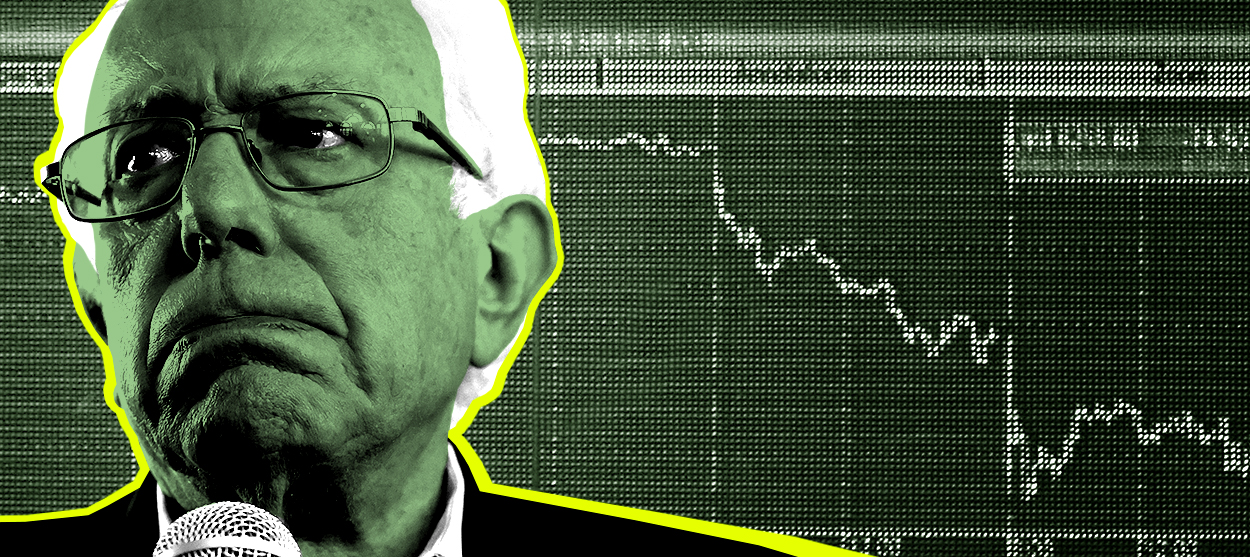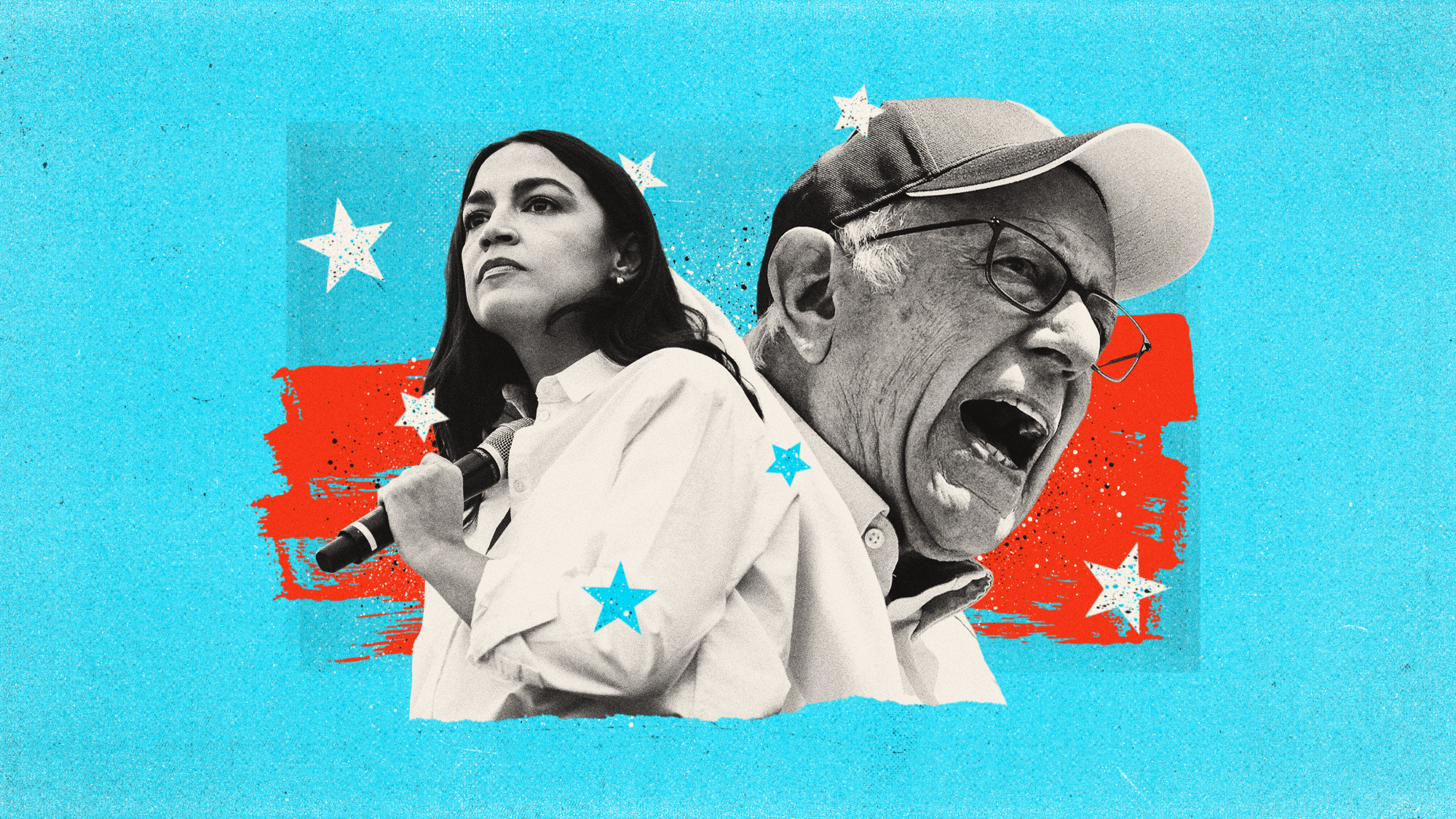If Bernie wins
Why a Sanders victory could do immense economic damage


A free daily email with the biggest news stories of the day – and the best features from TheWeek.com
You are now subscribed
Your newsletter sign-up was successful
With one week to go before voting begins in the contest to determine which Democrat will face President Trump in the 2020 presidential election, socialist Bernie Sanders is surging.
Sunday brought poll results showing the Vermont senator solidly ahead in Iowa, where caucuses will be held on February 3. That follows a poll released on Friday showing him leading by double digits in New Hampshire, which holds its primary eight days later. (Another New Hampshire poll published on Sunday also placed Sanders at the head of the pack.)
The prospect of the Democratic Party choosing as its standard-bearer one of the most left-wing candidates ever to seek the presidency raises all kinds of questions: Given that as recently as 2015 more than half the respondents in a Gallup poll said they wouldn't vote for a socialist, would Sanders face insurmountable obstacles in the general election? Or would his deployment of populist rhetoric make him uniquely well placed to win back formerly Democratic states that Trump managed to carry in 2016? If Sanders did manage to beat Trump, would he sweep enough left-leaning candidates into office with him to make it possible to fulfill the hopes of his supporters? Or would he be stymied by Congress at every turn, bitterly disappointing those who voted for him and inspiring some of them to embrace greater political militancy in the future?
The Week
Escape your echo chamber. Get the facts behind the news, plus analysis from multiple perspectives.

Sign up for The Week's Free Newsletters
From our morning news briefing to a weekly Good News Newsletter, get the best of The Week delivered directly to your inbox.
From our morning news briefing to a weekly Good News Newsletter, get the best of The Week delivered directly to your inbox.
Some of these scenarios sound hopeful, others ominous. But even the possibility that seems most optimistic — Sanders winning and enacting large parts of his agenda — comes with serious risk. The problem isn't that the kind of democratic socialism Sanders favors is incompatible with economic growth and prosperity. It's that the sharply polarized character of the American political system ensures that any serious attempt to shift toward socialism would produce a severe case of whiplash that could do immense economic damage.
Imagine it: Sanders wins the White House in a landslide and, with the help of left-leaning super-majorities in Congress, swiftly begins to fulfill his campaign promises. Taxes surge to levels not seen in decades, including a reversal of Trump's corporate tax cut. Medicare is massively expanded to include all Americans, putting the health insurance industry out of business and upending the status quo in the health-care sector (hospitals, doctors, and nurses in every region in the country would be affected). Higher education also undergoes radical change, as student loans are forgiven and public universities and colleges stop charging tuition. The financial sector faces major new regulations, with effects rippling outward to corporate America, which also has to absorb (in addition to large tax increases) a raft of new labor and environmental regulations. Meanwhile, deep cuts to defense spending hit military contractors hard.
Let's assume for the sake of argument that these changes wouldn't produce federal budget deficits of such magnitude that they lead to economic disarray, and that the country wouldn't face an Ayn Rand-style capital strike in which captains of industry horde their wealth and ingenuity to protest the prospect of confiscatory taxation and onerous regulation. Much of what Sanders aims to achieve already exists in Scandinavia, and those (much smaller and more homogeneous) countries enjoy solid levels of economic growth and prosperity. Sanders wants us to believe the same thing could be achieved in the United States, and let's stipulate for the moment that it could — at least in theory.
The problem comes when we confront political reality in the United States — and especially the uncertainty that attempting such massive reforms would inject into the economy.
A free daily email with the biggest news stories of the day – and the best features from TheWeek.com
For decades, policies have favored free markets and sought to create an environment in which business could prosper and thrive. Over the past three years, these broadly pro-business tendencies have been enhanced by an administration that has drastically cut corporate tax rates and worked to gut regulations, with promises of more to come. What Sanders is proposing to do would overturn this arrangement. It would mark one of the most radical changes in American history.
That in itself would leave businesses reeling. But just as destabilizing would be the looming 2022 midterm elections. In 1994, two years into Bill Clinton's presidency, voters responded to the administration's effort to pass a health-care reform bill by handing over control of the Congress to Republicans for the first time in 40 years. In 2010, two years into Barack Obama's presidency, passage of the Affordable Care Act led to the Democrats suffering the biggest losses for either party in a midterm election since 1938. (The GOP picked up 63 seats that year — 22 more than the Democrats took from Republicans in the so-called "blue wave" midterm election of 2018.)
Clinton's and Obama's health-care proposals were ambitious in their moments, but they would be dwarfed by what Sanders would try to achieve if he were to win the presidency. It's therefore quite possible and even likely that the 2022 midterm elections would produce a major backlash and lurch to the right. Businesses will know this — which means they will know that they know nothing about what to expect during the opening years of a Sanders administration.
That uncertainty would be poison for the American economy, as planning for hiring and expansion becomes close to impossible. The resulting contraction would not — or not simply — be a function of rapacious and greedy capitalists seeking to protect their income and wealth. It would also, and perhaps primarily, be a reasonable response to insecurity about the immediate future.
Economic growth depends on smart long-term planning. One important reason why democratic socialism works in Scandinavia is that there is a broad consensus in its favor, allowing businesses to know what they can expect. But there is no such consensus in the United States. On the contrary, there is deep dissension, and a long, entrenched tradition of resistance to anything resembling socialism that guarantees furious opposition and makes backlash and reversal highly likely. That's not a situation in which socialism is likely to thrive, as it must, by generating strong economic growth and revenue to pay for robust social programs and services.
For a glimpse of how America's growing partisan clashes can generate uncertainty and dysfunction, think about what's happened in international affairs over the past three decades. Administrations have swung wildly from the liberal internationalism of George H.W. Bush and Bill Clinton to the aggressive unilateralism and neoconservatism of George W. Bush, to the revived internationalism of the Obama administration, and finally to the chaotic and impulsive unilateralism of the Trump administration.
Our allies rejoiced when Obama was elected and even rewarded him with a Nobel Peace Prize that was mostly an expression of deep gratitude for the return of what they thought would be a strong partner in seeking to uphold an ever-expanding liberal international order. But Trump's insulting and impetuous behavior on the world stage has taught them that the Obama administration was only an interlude and that the American norm is now wild oscillations from one administration to the next. What they've learned is that the U.S. can no longer be trusted or relied on.
A Sanders victory would herald the expansion of this distrust and unreliability into the domestic economic realm — and business will be perfectly justified in pulling back, uncertain both about how much the socialist's proposals for radical change will affect their bottom line and whether a Republican victory two or four years later might reverse it all.
Just as foreign policy can't function well in an environment where the countries of the world don't know what to expect from one American president to the next, so the economy won't grow if the business sector finds it impossible to plan more than a few months in advance. It's important to see that this problem is not a function of socialism per se, but of our country's polarization.
Our differences are now so great that a change of party can signal a shift to an entirely different worldview. That isn't a situation in which elected officials should attempt a political revolution.
Want more essential commentary and analysis like this delivered straight to your inbox? Sign up for The Week's "Today's best articles" newsletter here.
Damon Linker is a senior correspondent at TheWeek.com. He is also a former contributing editor at The New Republic and the author of The Theocons and The Religious Test.
-
 Political cartoons for February 3
Political cartoons for February 3Cartoons Tuesday’s political cartoons include empty seats, the worst of the worst of bunnies, and more
-
 Trump’s Kennedy Center closure plan draws ire
Trump’s Kennedy Center closure plan draws ireSpeed Read Trump said he will close the center for two years for ‘renovations’
-
 Trump's ‘weaponization czar’ demoted at DOJ
Trump's ‘weaponization czar’ demoted at DOJSpeed Read Ed Martin lost his title as assistant attorney general
-
 The billionaires’ wealth tax: a catastrophe for California?
The billionaires’ wealth tax: a catastrophe for California?Talking Point Peter Thiel and Larry Page preparing to change state residency
-
 Mamdani vows big changes as New York’s new mayor
Mamdani vows big changes as New York’s new mayorSpeed Read
-
 Bari Weiss’ ‘60 Minutes’ scandal is about more than one report
Bari Weiss’ ‘60 Minutes’ scandal is about more than one reportIN THE SPOTLIGHT By blocking an approved segment on a controversial prison holding US deportees in El Salvador, the editor-in-chief of CBS News has become the main story
-
 Has Zohran Mamdani shown the Democrats how to win again?
Has Zohran Mamdani shown the Democrats how to win again?Today’s Big Question New York City mayoral election touted as victory for left-wing populists but moderate centrist wins elsewhere present more complex path for Democratic Party
-
 Millions turn out for anti-Trump ‘No Kings’ rallies
Millions turn out for anti-Trump ‘No Kings’ ralliesSpeed Read An estimated 7 million people participated, 2 million more than at the first ‘No Kings’ protest in June
-
 Ghislaine Maxwell: angling for a Trump pardon
Ghislaine Maxwell: angling for a Trump pardonTalking Point Convicted sex trafficker's testimony could shed new light on president's links to Jeffrey Epstein
-
 The last words and final moments of 40 presidents
The last words and final moments of 40 presidentsThe Explainer Some are eloquent quotes worthy of the holders of the highest office in the nation, and others... aren't
-
 The anger fueling the Bernie Sanders and Alexandria Ocasio-Cortez barnstorming tour
The anger fueling the Bernie Sanders and Alexandria Ocasio-Cortez barnstorming tourTalking Points The duo is drawing big anti-Trump crowds in red states
